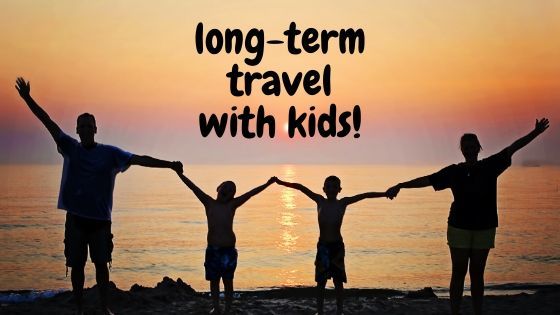Traveling the world long-term sounds amazing. But you might write off the idea of traveling long-term with kids. After all, wouldn’t travel be so much simpler without all of the added stresses of children to care for and entertain?
The short answer is yes. Obviously, travel without kids is easier. But just because traveling with kids is more complicated doesn’t mean it isn’t worth it. If you’re a parent and you’re wondering how to make this dream happen, there are ways to make it fun and memorable.
Here are 8 tips for long-term travel with kids. (For the sake of this discussion, we’ll define long-term travel as at least three months at a time.)
See also: Pros and Cons of Traveling Solo, as a Couple, or a Family
Nora’s Note: I pride myself on writing all the content for this site (aside from my Financial Case Study interviews). However since I don’t have kids, I can’t write authoritatively about it. So I asked my friends at Money Crashers if they could help. Their writer Rosalie Conger is a travel writer in the Midwest. She travels frequently and has spent six months in Europe with her family of four. Here’s her advice for traveling long-term with kids!

Long-Term Travel With Kids Tip #1: Be Flexible
This is really the top travel tip in every situation. No matter who you travel with, where you go, or what you do, the key to enjoyable travel is to always be flexible.
Traveling means embracing changes and surprises. Things won’t always go according to plan, especially with kids in tow. Every parent knows flexibility is an essential quality when navigating parenthood.
You might be planning on a six-mile hike, but after 20 minutes, your youngest begins whining and you just don’t feel like pushing through the entire trail. Or maybe one child gets sick in the middle of the night, you’re all exhausted the next morning, and you miss your train.
See also: How to Stay Healthy While Traveling – Natural Preventions and Cures
Whatever your itinerary, you’ll be happier if you approach every travel experience with the understanding that you might be forced to change plans at the last minute. But don’t worry. Sometimes the best experiences happen when you adjust your plans and try something unexpected.
2. Minimize Activities
While you’ll want to hit must-see attractions, it’s always good to lower your expectations when traveling with kids. Minimize the number of big activities or attractions you plan to see each day.
The amount of stimulation your family can take depends on your family’s temperament, size, and other factors. Prepare for young kids to get grumpy, hungry, or tired. A good rule of thumb when traveling with very small children is to pick one main activity or big event on any given day.
If you’re a parent of older kids or teens, you can adjust that plan accordingly and maybe do more activities. Just be sure to leave room for spontaneous fun as well, so you’re not constantly rushing off to the next thing.
3. Let Kids Have a Say
Be sure to give your kids some ownership of their time on the road. This should be a true family adventure. Younger kids can enjoy picking between two options, while older kids and teens may get more freedom to plan an entire day.
Kids will be more pleasant if they know part of the travel itinerary will be in their hands. They should get to pick some of the places you’ll visit, restaurants where you’ll eat, and activities you’ll do.
4. Embrace Frugal Travel
Unless you’re operating from unlimited financial resources, you need to embrace a certain level of frugality when traveling long-term with kids.
Fortunately, plenty of free or inexpensive opportunities for enrichment and fun are available. You can have a blast hiking picturesque trails, taking the kids to a playground, or exploring an outdoor music festival. Tons of kid-friendly activities are free, so be sure to do your research and find something fun that doesn’t cost much.
It’s especially important to use your frugal gene if you’re traveling long-term. It’s different to splurge a little when your trip is only a week or two. But being on the road for three months or more means the expenses will add up, so save money whenever you can.
See also: How to Create a Long-Term Travel Budget
5. Minimize Transitions
As experienced long-term travelers often preach, minimizing transitions can be a lifesaver. So many of us try to rush from one city to the next, barely spending more than a night or two in each one. Every time you leave your lodging, you have to pack everything up and transport your family to a new place. It’s a huge pain, it wears everyone out, and it leads to more bickering among family members.
One way to make the most of your travel is to slow down. Minimize transitions by staying in one location or city for a longer portion of your trip. Don’t worry about “missing out” by not seeing a huge number of places. Instead, you can settle into one spot and really appreciate it.
6. Create Enough Space for Everyone
While it might be fine to squeeze into tight living quarters for a shorter trip, longer trips require sufficient space for everyone. Ease the stress of traveling with kids by ensuring everyone gets enough room to be comfortable.
Your budget may not accommodate luxury, but try to be mindful of how much room each member of the family needs. You can also squeeze into tighter spaces for shorter stays in more expensive locales, like Paris. But then you can compensate by renting a three-bedroom cottage in the countryside in Italy, which might be a better overall value. Everyone will be happier if they’re getting good sleep at night and can have personal space during the day.
7. Get Medical Travel Insurance
Traveling long-term may mean your regular health insurance doesn’t apply. It’s extremely important to make sure you and your kids are protected in the event of someone getting sick or injured while traveling.
Research reputable travel insurance companies for their travel plans and find a policy that fits your needs. The longer you’re away, the higher the likelihood of medical issues, and the last thing you want is to find yourself without medical care in a foreign country or state.
See also: The Complete Guide to Travel Insurance, including glossary of terms
And if you want international health care, see Expat Insurance – Health Insurance for Long-Term Travelers
8. Recognize That Travel Is Different From a Vacation
While many people think the terms are synonymous, long-term travel is not the same thing as a vacation. You’ll benefit from thinking of your trip as traveling with kids, instead of going on vacation. Vacation tends to be filled with “special” or “luxury” activities, but traveling is more like ordinary life, just in a different place from your home.
Traveling with kids is still real life. Kids get grumpy and hungry and tired and sassy, just like they do at home. So remember that not every moment or every day can be an amazing experience. Don’t get hung up on making everything perfect.
You’re doing life together when you travel as a family. When traveling for a long period of time, you’ll experience plenty of highs and lows, so just roll with it and enjoy yourself.


